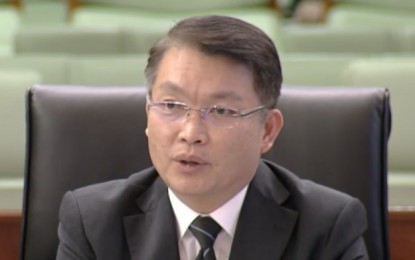Cambodia revising gambling laws to attract investment
Jun 24, 2014 Newsdesk Latest News, Rest of Asia, Top of the deck

The Cambodian government is in the process of amending its gaming laws in a bid to draw major casino operators, industry sources have confirmed to GGRAsia.
Earlier on Tuesday, the Phnom Penh Post reported that the new draft of the national casino law could be finalised as early as this year. It said regulators are also considering legalising online gambling in the country.
NagaWorld, a casino resort in Phnom Penh operated by Hong Kong-listed NagaCorp Ltd, reports in filings it has a 70-year licence for land-based casino gaming, valid until 2065, and a 41-year gaming monopoly, ending in 2035, for activities within a 200-kilometre (124-mile) radius of the capital.
The newspaper quoted Ros Phirun, spokesman for the Ministry of Economy and Finance’s gaming and casino department, as saying the new draft of the casino law will be stricter and more transparent.
Gaming companies from time to time explore Cambodia as potential destination for their integrated resorts due to the low tax regime, but are concerned about the legal regulatory framework, the market size and the scrutiny from gaming regulators in their home jurisdictions, according to one of the industry sources.
The same source told GGRAsia that fair and thorough enforcement of any new casino law that might be enacted by Cambodia would be key to such a statute’s success. “Having rules with ad hoc enforcement leaves avenues for individual discretion,” said the person, who has knowledge of the bill being drafted.
The current enforcement climate, whereby locals are allowed in some of the country’s casinos despite that being illegal, “creates a worse-off business environment for operators and investors,” the person told GGRAsia.
It is not yet confirmed if locals will be legally allowed to gamble in Cambodian casinos. But only to allow tourists to enter casinos wouldn’t make Cambodia an attractive destination, industry insiders say.
A total of 4.2 million tourists visited the country last year, according to Cambodia’s Ministry of Tourism data. More than 20 percent of the visitors were from neighbouring Vietnam. Mainland China was the second biggest source of tourists, accounting for 11 percent of visitor arrivals last year.
The ban on locals is currently “poorly enforced and subject to at hoc discretion,” the first industry industry source said. The government may consider imposing an entry levy on Cambodia nationals, following Singapore’s example, the person added.
Singapore imposes on its citizens and permanent residents a statutory entry levy of either S$100 (US$80) for 24-hour access, or S$2,000 for a year’s entry but is content to give foreigners free access.
Industry sources have also confirmed that regulating online gambling has been suggested, although the process is still in its initial stage.
The regulation by Cambodia of online gambling has been mooted for some years. It would potentially offer regional competition to the Philippines.
“While we don’t provide online licences yet, it is in the process of being studied,” the Phnom Penh Post quoted Mr Phirun as saying. The report didn’t specify whether such regulations would be for offshore online gambling, onshore activities, or both.
It was reported in 2010 that Jack Lam Yin Lok, chairman of Macau junket operator Jimei Group, which also has interests in Philippines casino gaming and online gaming, was considering relocating his Internet trade to Cambodia for tax purposes.
The Philippines offers online licences to companies providing online gaming outside the country’s domestic market. First Cagayan Leisure and Resort Corp, a body authorised by the Philippines government to act as an online operator in its own right as well as regulator for international operators seeking an online licence, was set up following the enactment of that country’s Interactive Gaming Act in 2003.
Online betting operators are not permitted in Cambodia. However, many casinos operate these facilities with the tacit permission of local authorities, says the Phnom Penh Post.
The newspaper adds that the Economy and Finance Ministry has so far granted 56 casino operating licences for 7,660 slot machines and 2,568 gaming tables nationwide. Casino and gaming-related taxes earned the government US$22 million in 2013.
Related articles
-
 Light & Wonder flags multi-year...
Light & Wonder flags multi-year...Nov 08, 2024
-
 Smart table rollout at Wynn casinos in...
Smart table rollout at Wynn casinos in...Nov 05, 2024
More news
-
 Macau to get 36mln visitors in 2025:...
Macau to get 36mln visitors in 2025:...Nov 21, 2024
-
 EBITDA a focus in Macau market share...
EBITDA a focus in Macau market share...Nov 21, 2024
Latest News
Nov 21, 2024
Macau’s 2025 visitor tally could reach 36 million, or a circa 9-percent gain on this year’s projected 33 million. So said Lei Wai Nong (pictured in a file photo), the city’s Secretary for...Sign up to our FREE Newsletter
 (Click here for more)
(Click here for more)
Pick of the Day
”[Baccarat side bets in Macau] are becoming more popular amongst players, based on what we observed when we conducted our [monthly premium mass] table surveys”
George Choi and Timothy Chau
Analysts at Citigroup
Most Popular
 Gaming technology firm IGT reports hacking incident November 21, 2024
Gaming technology firm IGT reports hacking incident November 21, 2024  US$30bln 2025 GGR target achievable for Macau: CE November 19, 2024
US$30bln 2025 GGR target achievable for Macau: CE November 19, 2024  Marina Bay Sands projects 40pct EBITDA leap post extension November 20, 2024
Marina Bay Sands projects 40pct EBITDA leap post extension November 20, 2024  Macau big-event outdoor venue gets trial run Dec 28: CE November 20, 2024
Macau big-event outdoor venue gets trial run Dec 28: CE November 20, 2024  Future of gaming is the online format: Pagcor chairman November 20, 2024
Future of gaming is the online format: Pagcor chairman November 20, 2024









